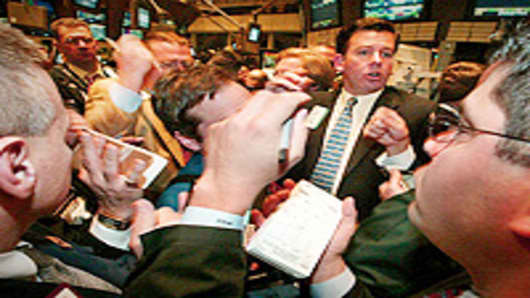For investors who like action, this summer's stock market will pack as much as any Will Smith movie while it looks for a turning point.
Unpredictable days like Monday, when the indexes moved from positive to negative at will and with little notice, are likely to become the norm as Wall Street searches for a market bottom and a recovery that could be months down the road.
"We're getting news every 5 or 10 minutes that seems to change the psychological positions of the traders. That's what's really making this market turn," says Michael Kresh, president of M.D. Kresh Financial Advisors in Islandia, N.Y. "Frightened money is jumping all over the place, and as long as that happens we're going to get these whipsaw days."
Market watchers have been probing for signs of a bottom since the market's rally off its March lows fizzled. But without a significant increase in volatility, a capitulation can't happen where the market becomes hugely oversold, forms a bottom and then heads upwards.
The Chicago Board Options Exchange's Volatility Index spiked as much as 8 percent Monday before settling to about half that. Though wild swings in trading such as what happened Monday often accompany bottoms, the Vix remains well off the mid-30s range that would indicate a high level of fear. The index dipped Tuesday even as stocks continue to swing back and forth.
That leaves most analysts unconvinced that a capitulation point has hit, though there is sentiment that a bear market rally is on the near horizon.
"I think you would have had it yesterday if the Fannie Mae-Freddie Mac news hadn't come out," says Dave Rovelli, managing director of US equities for Boston-based Canaccord Adams. "You're due for a very violent short-term bounce."
The market had been largely holding its own Monday until Lehman Brothers questioned the capital strength of government-sponsored mortgage lenders Fannie Mae and Freddie Mac . The two companies plunged more than 15 percent each on the news, but leveled Tuesday on assurances that they are adequately capitalized and an underlying sentiment that the government wouldn't let the two largest mortgage providers collapse.
Financials are considered the biggest weight on the indexes, particularly the Standard & Poor's 500, and the market is unlikely to form a bottom and rebound until the bad news washes out regarding bank losses.
"Until the financials stop going down you're not going to have a significant rally in the S&P. They don't have to go up, they just have to stop going down," Rovelli says.
Earnings season, which kicks off today but moves into high gear next week with some of the major Dow components reporting, could hold the key to a market resurgence.
"The market's all about expectations," Bernie McSherry, of Cuttone and Co., said on CNBC. "If the earnings come in and surprise to the upside we may get a rally like we did a quarter ago."
More Room to Fall?
Kresh will be watching bank earnings closely, especially those with high exposure to subprime mortgage problems. Should banks start to level out, he sees a chance for investors to get in.
"You saw what happened yesterday--the market almost completely tanked. It all relates to what is now more than a year-old problem, and that is what is the underlying value of the subprime mortgage market," Kresh says. "As long as that fear is there, there is enormous opportunity. We have to be near a bottom because I can't personally believe those assets that have been written down to zero are worth zero."
Larry Edelson, financial analyst at Money and Markets online investing newsletter, says stocks still have room to fall and need more fear in the market before a bottom comes. He sees the Dow dropping to as low as 9,200 before a turnaround starts to take hold.
"Somewhere around there I think we'll see capitulation and maybe a bottom, but we'll have to wait and see," Edelson says. "It won't be a straight-down affair. There will be a lot of fake-out moves and a lot of volatility. My guess is that it's probably going to be election-related."
Kresh also sees heavy volatility ahead--the kind the market needs--but believes a bottom could be closer.
"We still have reaction to good news and bad news that's very, very violent," he says. "What we'll need to see to know if we've really turned the corner is the market will look at mildly bad news and shrug it off and look at mildly good news and take it as a very strong indication that we're going up."
In the meantime, Edelson advises investors to be cautious. He advocates plays in natural resources as well as good dividend-paying stocks in Asia, which US investors can play through the Asia Pacific Fund ETF.
"There's a lot of uncertainty out there, which causes volatility," he says. "Certainly the economic news is not good, and a lot of people are very, very nervous, and rightfully so."


